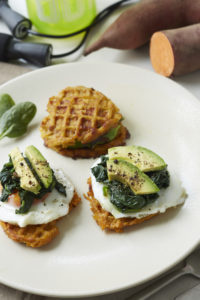Innovative new protein foods to be made from plants, fungi, and byproducts
A ground breaking new EU project to develop new alternative proteins will launch in January 2020.
A range of highly innovative new-protein foods made from plants, fungi, by-products, and residues will soon emerge from Smart Protein, a new Horizon 2020 project fundSweet potato, Ipomoea batatas
ed by the European Commission.
A primary aim of the project is to help build a future-proof protein supply by creating sustainable and nutritious alternative proteins. This is in direct response to some of the most urgent challenges faced by the planet, including climate change and global food security.
It is expected that the first wave of products – including plant-based meats, fish, seafood, cheese, infant formula, and other dairy products, as well as baked goods – will go to market in or around 2025.
Emanuele Zannini, Senior Research Officer with the University of Cork and the Lead Coordinator of Smart Protein, said: “With the Smart Protein project, we are reconsidering the entire protein value chain from production to consumption in terms of both productive and environmental performance. We are also targeting soil-health restoration through organic regenerative agriculture practices that are able to shift from carbon-source to carbon-sink agriculture, which is more resilient to the effects of climate change and helps farmers’ long-term financial futures.”
A total of 33 partners from industry, research, and academia across 21 different countries, including Ireland will collaborate on the project, which is led by the School of Food and Nutritional Sciences at University College Cork in Ireland. Major collaborators include Fraunhofer, the University of Copenhagen, ProVeg International, Barilla, Thai Union, Beotanics, and AB InBev.
Smart Protein’s approach and strategy are unique in that the key focus is on by-products and residues, ingredients that are usually used for animal feed. Microbial biomass proteins will be created from edible fungi by up-cycling side streams from pasta (pasta residues), bread (bread crusts), and beer (spent yeast and malting rootlets).
New products will also be developed from plants, including fava beans, lentils, chickpeas, and quinoa – with a focus on improving their structure, taste, and flavour. Investigations into cost-effective protein extraction, protein chemistry, polymeric structure, physicochemical behaviour, and protein-protein interaction will be carried out in order to maximise the functionality of these proteins and customise their usage in food and drinks.
Verena Wiederkehr, International Head of Food Industry & Retail for ProVeg International, said: “These innovative techniques and processes have not been deployed on a project of this type and scale before, and the potential positive impact for the planet cannot be underestimated. By upcycling byproducts and residues to produce edible protein for human consumption, we are taking huge strides towards a much-needed circular economy that can truly feed our rapidly-growing population.”
Smart Protein has a total budget of €9.6 million, €8.2 million of which is provided by the European Commission. It will run for four years from 1 January 2020.
The Smart Protein project has received funding from the European Union’s Horizon 2020 innovation programme under grant agreement number 862957.
Smart Protein builds on the key scientific findings from the previous Horizon 2020 project, PROTEIN2FOOD. Both projects emerged from The 2030 Agenda for Sustainable Development, adopted by all United Nations Member States, which established judicial obligations to rethink our food systems.
Smart Protein will be advised by a stakeholder advisory board consisting of experts and organisations from across the entire supply chain. Stakeholder advisory board members take part in annual meetings, advise the direction of the project, and are regularly updated about new developments. The board is open for new members to join. If you are interested in joining, then please contact ProVeg using the contact details below.


